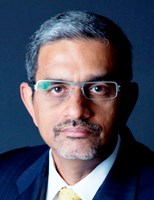According to the World Bank, International Monetary Fund and Africa Development Bank, Africa's economy is estimated to grow between 5.5 and 6% in 2012, outpacing projected growth rates in Europe and North America. At the same time, Africa's middle class now accounts for 34% of the continent's population, with individuals under 30 years of age, making up the largest age group. Many of these young African men and women are university educated, unemployed or underemployed.
But, despite the projected positive growth, Africa will continue to face significant development challenges through 2013.
The statistics seem almost overwhelming when you consider that by 2025, 440 million people will be added to Africa's population; only 30% of Africa's roads are paved; 300 million people in sub-Saharan countries lack access to safe water; 14 of the 54 countries have already experienced water stress with another 11 expected to join them by 2025.
So what does this mean? Where does the responsibility for change lie?
We believe it is a collective responsibility. For the private sector to partner for growth, foster innovation and find ways to empower and enable entrepreneurship and for the public sector to be more welcoming to investors and quickly learn how to manage the risks that accompany international capital flows into the respective economies.
Smarter solutions for Africa
More than ever, IBM believes that the time for Africa is now. There is an opportunity to improve the lives of African people through smarter infrastructure, smarter healthcare and smarter education. These smarter systems can make a material difference to the health of the global economy, the health of our planet and the health and prosperity of global society.
In collaboration with the City of Johannesburg in South Africa, we have developed a five year public safety strategy aligned to the city's 2040 vision of a smart city.
And in the City of Tshwane - we're helping tackle the city's water issues using a five-point plan developed by a team of IBM experts last year. The plan will see the city to reduce non-revenue water by 25% and effectively save the city over R250 million a year.
Further afield in Rabbat, Morocco, a team of IBM experts devised a plan for a more efficient and better integrated transportation system in the greater metropolitan area of Rabbat including Sale and Temara.
Ghana and Nairobi in Kenya - also form part of the 2012 recipients list - and are working on "smarter" city initiatives.
To facilitate Africa's rapid development agenda, we have realised that our investment of the first 50 years on the continent, needs to be escalated - it is why we are undergoing our own expansion.
We have grown from a direct presence in four countries in 2006, to opening subsidiary offices in Nigeria and Kenya in 2009, to a presence in more than 20 cities in 2012 and by 2015; we will have expanded our footprint to many more across Africa and the Indian Ocean islands. We have not only created direct employment opportunities for people, but have also focused our efforts on establishing an eco-system of partners and resellers.
Our global presence, expertise and best practice sharing model, makes us stronger locally. And on a continent with the breadth and complexity of Africa, we believe, and our clients are re-enforcing this belief, that by combining the best of global, with investments in people who are on the ground, in the markets that we serve, that we are differentiating ourselves from many other players.
It is why we continue to partner with local and national government; universities; our clients and an ecosystem of partners; resellers and developers, to create smarter solutions for Africa.
Smarter Cities Challenge
One way in which we are doing this, is by earmarking African cities for our Smarter Cities Challenge. The challenge targets 100 cities around the world, with an investment of $50 million over three years. Since its inception in 2010, two cities on the continent have already benefited, with another three on the 2012 recipients list.
Sometimes, it is not about having a brand that is visible, but more about the impact you are making. We want to build a smarter planet - driven by people who think not about the challenges of the past, but the opportunities of the future.

























